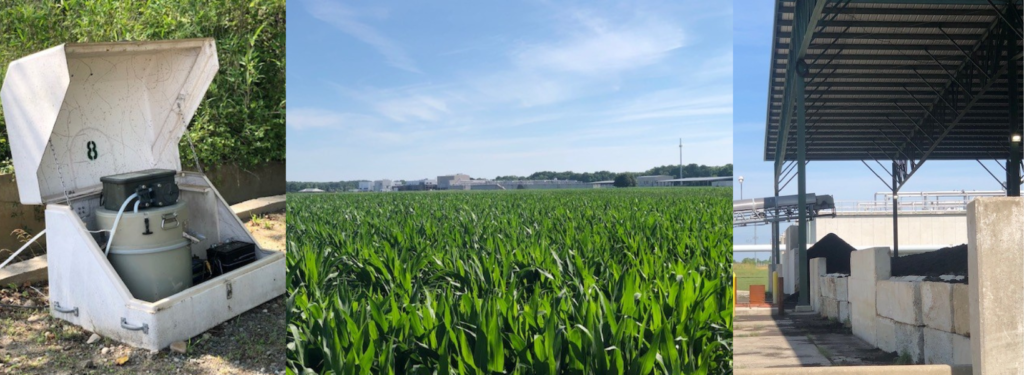For nearly 40 years the Progress Farm at the Hampton Roads Sanitation District (HRSD) has served as a critical asset to understanding biosolids management. Progress Farm is a research area of approximately 200 acres of cropland, forested land, and wetlands. It is home to pollinators, tulip trees, a variety of plant life in the wetlands, and a lake that provides excellent fishing for neighbors. It also provides access to the Back Bay National Wildlife Refuge.
Primarily rotating corn and soybeans, this agricultural land provides ideal conditions for the application of biosolids products and for conducting research related to land application. Biosolids are produced during the wastewater recovery and when applied to land, biosolids add nutrients, improve soil structure, and enhance moisture retention. Applying biosolids to land has economic and waste management benefits since it saves space in landfills, recycles a waste product, and reduces demand for synthetic fertilizers.
Research collaborators have the opportunity to test soils, crops, groundwater and local surface waters to evaluate the safety and efficacy of the land application of biosolids in agricultural management.
Most recently, Dr. Linda Lee of Purdue University received a $2.3 million grant in 2020 from the U.S. EPA to conduct research in Pennsylvania and Virginia, specifically at HRSD’s Progress Farm. This important study will evaluate the levels of PFAS in land-applied biosolids; the fate, transport and crop uptake of PFAS; the levels of PFAS in local rural water supplies; and the ways in which climate, landscape and hydrology affect PFAS movement and distribution. PFAS are a family of chemical compounds commonly used in many different products we encounter daily, which is how trace amounts (parts per billion or less) are found in wastewater and biosolids and other residuals. Fortunately, PFOA and PFOS, the most concerning and most-researched PFAS, have been mostly phased out, reducing potential risk. Dr. Lee’s research will continue to use data from HRSD as she concludes her work over the next few years.
Dr. Lee’s research is one of four research projects being funded by U.S. EPA to better inform the development of standards and policies for biosolids management.
The HRSD research farm and other similar sites are uniquely situated to investigate these and many other research questions. Farms with detailed history and soil records allow researchers to more accurately evaluate the crop rotation and any application of nutrients – biosolids products or otherwise – over time. As with any research project, more information is better.
In addition, HRSD is committed to investing in research, infrastructure, and planning for the future to continue serving over 1.7 million people in southeast Virginia.
Jamie Heisig-Mitchell, Chief of Technical Services, HRSD said, “the research farm has long provided a site that demonstrates the safe application of biosolids product. Going forward, the Progress Farm will continue to provide an opportunity to quantify the benefits of land application and address the research questions of the day. The known history of the research farm increases its value for state and national research projects.”
Research is only part of the HRSD’s continuing initiative to support the community and serve as an excellent partner. With the community opening up after COVID, HRSD is welcoming its neighbors for open houses to learn about the wastewater treatment as well as highlight the regulated process to produce quality biosolids products. In addition, HRSD has partnerships with local schools, offering Earth Day activities and, more recently, hosting an art contest, where the winner’s drawing has been painted as a mural on its campus across from a park.
Future master planning will focus on increasing this partnership with the local community, continuing to preserve this land, its rich history all while continuing to focus first and foremost on protecting public health and local waters through effective wastewater treatment for the residents of southeast Virginia.
